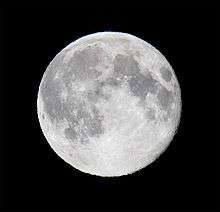Luna
English
Etymology
From Latin lūna, by way of Middle English lune, luna (“the moon”).
Pronunciation
- IPA(key): /ˈlunə/
- Rhymes: -uːnə
Proper noun
Luna
- The name of Earth's moon.
- (Roman mythology) The sister of Aurora and Sol; the goddess of the moon; equivalent to the Greek Selene.
- A female given name.
- 1837 James Hogg, "The Mysterious Bride", Talks and Sketches: The Shepherd's Calendar (Blackie & Son), page 343:
- - - - and it so happened, that in one of old Bryan's daughters named Luna, or more familiarly Loony, he perceived, or thought he perceived, some imaginary similarity in form and air to the lovely apparition.
- 2003 J. K. Rowling, Harry Potter and the Order of the Phoenix (Bloomsbury, →ISBN, page 236:
- A few seconds later, Luna Lovegood emerged, trailing behind the rest of the class, a smudge of earth on her nose, and her hair tied in a knot on the top of her head.
- 1837 James Hogg, "The Mysterious Bride", Talks and Sketches: The Shepherd's Calendar (Blackie & Son), page 343:
- A given name for a female pet.
- (alchemy) Silver.
Coordinate terms
Derived terms
Translations
Earth's moon — see Moon
Catalan
Cebuano
Danish
German
Italian
Etymology
From Latin Lūna, from Old Latin losna, from Proto-Italic *louksnā, from Proto-Indo-European *lowksneh₂, derived from the root *lewk- (“bright”).
Cognates include Armenian լուսին (lusin), Spanish luna, Portuguese lua, Romanian lună, Russian луна́ (luná)
.jpg)

Pronunciation
- IPA(key): /ˈlu.na/, [ˈl̺uːn̺ä]
- Rhymes: -una
- Homophone: luna
- Stress: lùna
- Hyphenation: lu‧na
audio (file)
Proper noun
Luna f
- (astronomy, astrology) the Moon
- c. 1226, Francis of Assisi, Cantico delle creature [Canticle of the Creatures], printed by the Biblioteca del Sacro Convento di San Francesco, page 2:
- Laudato ſi mi ſignore ᵱ ſora luna e le ſtelle, in celu lai foꝛmate clarite ⁊ p̃tioſe ⁊ belle.
- Praised be you, my Lord, through Sister Moon and the stars; in heaven you have made them clear and precious and beautiful.
- 1321, Dante Alighieri, “Inferno [Hell]”, in La divina commedia [The Divine Comedy], 1st edition, Foligno: Printed by Johannes Numeister and Evangelista Mei, published 1472, Canto VII, lines 64-66:
- che tutto l oro che ſotto la luna ¶ et che gia fu de queſte anime ſtanche ¶ none potrebbe farne poſar una
- « […] for all the gold that is beneath the moon, ¶ or ever has been, of these weary souls ¶ could never make a single one repose».
-
- (mythology, Roman mythology) Luna
- Synonym: Selene (Greek mythology)
- (heraldry) A full moon.
- A female given name
- A surname.
Anagrams
See also
| Solar System in in Italian · sistema solare (layout · text) | ||||||||||||||||
|---|---|---|---|---|---|---|---|---|---|---|---|---|---|---|---|---|
| Star | Sole | |||||||||||||||
| Planets and dwarf planets | Mercurio | Venere | Terra | Marte | Cerere | Giove | Saturno | Urano | Nettuno | Plutone | Haumea | Makemake | Eris | |||
| Notable moons | — | Luna | Fobos Deimos |
— | Ganimede Callisto Io Europa |
Titano Rea Giapeto Dione Teti Encelado Mimas |
Titania Oberon Umbriel Ariel Miranda |
Tritone | Caronte Idra Notte Cerbero Stige |
Hiʻiaka Namaka |
— | Disnomia | ||||
Latin
Etymology 1
Noun
Lūna f (genitive Lūnae); first declension
- Alternative form of lūna; the Moon
- AD 334–7, Julius Firmicus Maternus (author), Wilhelm Kroll and Franz Skutsch (editors), Matheseos libri VIII, Leipzig: In aedibus B. G. Teubneri, volume I: Libros IV priores et quinti prooemium continens (1897), book iv, chapter i, § 10 (page 199, lines 16–19):
- Est itaque Luna aut synodica aut plena aut dichotomos aut menoides aut amficyrtos et per has mutata formas cursum menstrui luminis complet.
- (please add an English translation of this quote)
- AD 334–7, Julius Firmicus Maternus (author), Wilhelm Kroll and Franz Skutsch (editors), Matheseos libri VIII, Leipzig: In aedibus B. G. Teubneri, volume I: Libros IV priores et quinti prooemium continens (1897), book iv, chapter i, § 10 (page 199, lines 16–19):
Etymology 2

The city's amphitheatre
Pronunciation
- (Classical) IPA(key): /ˈluː.na/, [ˈɫuː.na]
Proper noun
Lūna f (genitive Lūnae); first declension
Declension
First declension.
| Case | Singular |
|---|---|
| Nominative | Lūna |
| Genitive | Lūnae |
| Dative | Lūnae |
| Accusative | Lūnam |
| Ablative | Lūnā |
| Vocative | Lūna |
Derived terms
- Lūnēnsis
Slovene
Etymology
See lúna.
Pronunciation
- IPA(key): /ˈlùːna/
- Tonal orthography: lúna
Declension
Synonyms
Spanish
Pronunciation
- IPA(key): /ˈluna/
Proper noun
Luna f
This article is issued from
Wiktionary.
The text is licensed under Creative
Commons - Attribution - Sharealike.
Additional terms may apply for the media files.